It happened again. I fell off a scooter and broke my fibula bone located just beneath my knee, ending up in a hospital. I say “again” because this happened before, making it the third time I’ve broken a leg. The first time I tore a muscle in my right foot, then I tore my anterior cruciate ligament (ACL) on my left leg, and now I broke a bone. Every single time was for a different reason, so arguably there is a learning curve, meaning I’m not repeating previous mistakes and accidents, but still the end result isn’t ideal.
Luckily, this time I have experience dealing with hospitals and I am still a happiness expert, meaning that despite the physical pain and huge inconvenience this whole situation is causing me, I am still rather positive and this situation hasn’t broken my stride. And yet, this experience is completely different since now I am in a public hospital, as opposed to a private one I was in before.
This means that I am now face-to-face with other patients who are suffering from all sorts of problems. In other words, I am suffering, but there are many other people in pain, which made me wonder who suffers more and to what extent my happiness theories apply in this rather negative, yet necessary, place. This made me think that all suffering is relative, all happiness is relative, and there is a great lesson in me breaking a leg for a third time.
All Happiness is Relative
My broken bone drastically reduces my mobility, gives me physical pain, and takes away from my ability to focus on things I would want to do otherwise. Of course, this is also the case with all other patients in this hospital, but not everyone is having the same problems, meaning that there are patients with life threatening conditions, some with light bodily complaints, and everything in between.
On this scale of pain, it is logical to conclude that patients who are suffering more should get a priority treatment. This is exactly what happens in this hospital, as doctors have to make these morally difficult decisions all the time, where semi-healthy patients are being left almost to the point of death, because there are patients who are even in a worse state than them and need priority according to the system.
The accident also happened in the middle of COVID-19 pandemic, meaning that half of the hospital beds was given to the COVID department, and now there are the same amount of patients as before, but the hospital is only able to give them half of the attention. Practically speaking, there are patients who are sleeping in the hallways (as I did on my first two days in this hospital) and everyone else, including nurses, doctors, patients, and visitors, are on their last nerves because the service is just that much slower.
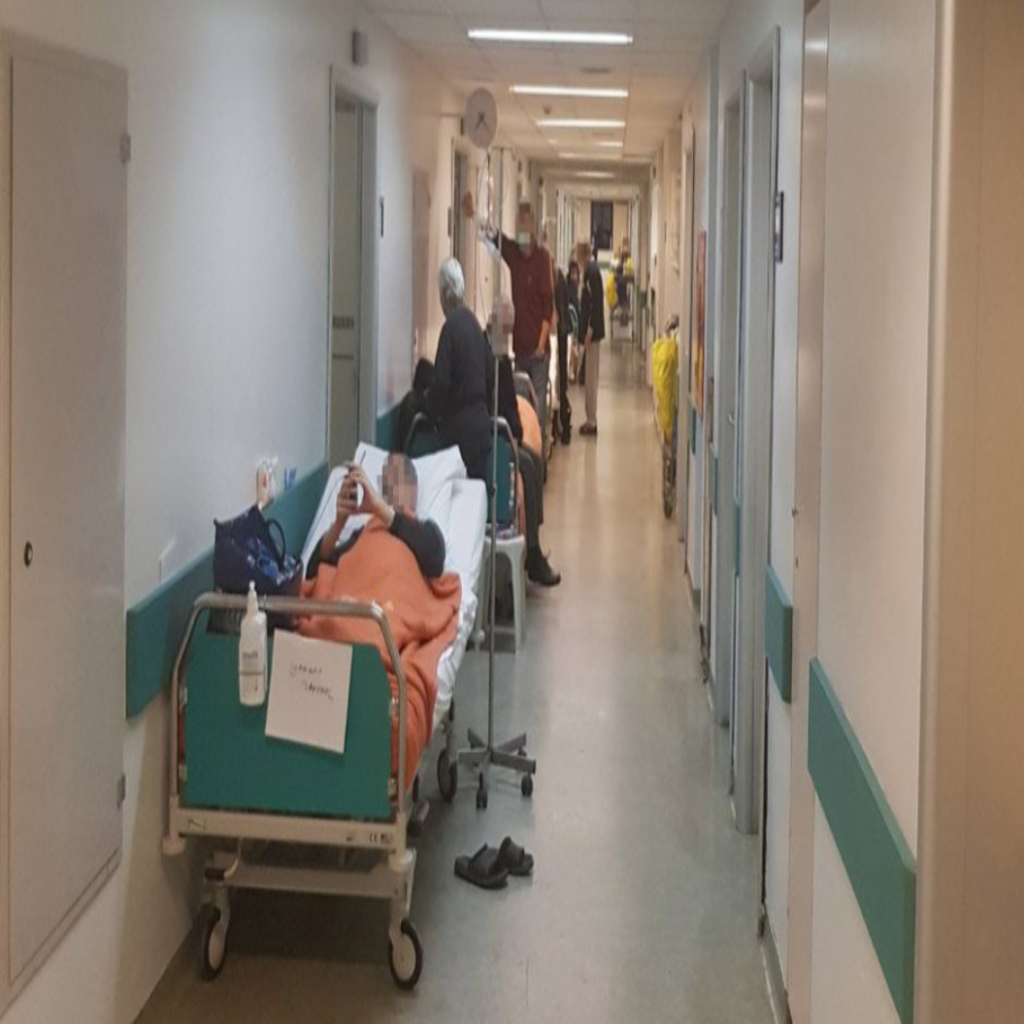
All Suffering is Relative
Still, personally, I don’t think its fair to compare the suffering of one individual to the next one, since everyone here is suffering and their pain is relevant to them personally at that moment, even if the other patient next door needs more urgent attention.
Still, this is also a great metaphor to what is happening to everyone else outside the hospitals in the “healthy” world, since almost everyone is suffering in one way or another. There, in the “real world”, people are also in pain, experiencing negativity, setbacks, disappointments, rude people, stress, not getting what they want from life, and all sorts of other negative events. In this world, we may want to compare the level of suffering of different people, such as these of the rich and the poor, but like in a hospital, pain is pain and it is relevant to people who are experiencing it. And since all people are suffering all the time, in one form or another, such as when they are experiencing the above mentioned negative emotions, we can state that it is morally wrong to compare individual level of pain, although we do it all the time.
In other words, often, we don’t have sympathy for the pain of other people, especially when they are better off than we are. Sure, we can be open to empathizing with the suffering of other people, especially when they are worse off than we are, but more often than not, we are overly consumed by our own problems to a point of partial or complete disregard for the pain of others, screaming “me, me, me, look how horrible my life is.” At the same time, we will look at people who have what we wish to have, our definition of “rich,” and we will say how lucky they are to have that, completely disregarding their problems, seeing them as quality problems or snobbish. Respectfully, these people who we define as “rich” will be consumed by their own set of problems, which to them will sound pertinent to a point of partial or complete disregard of everyone’s else’s pain. And this is an infinite cycle of pain we are all stuck in, whereas the only true way to escape it is to become Optimally Happy.
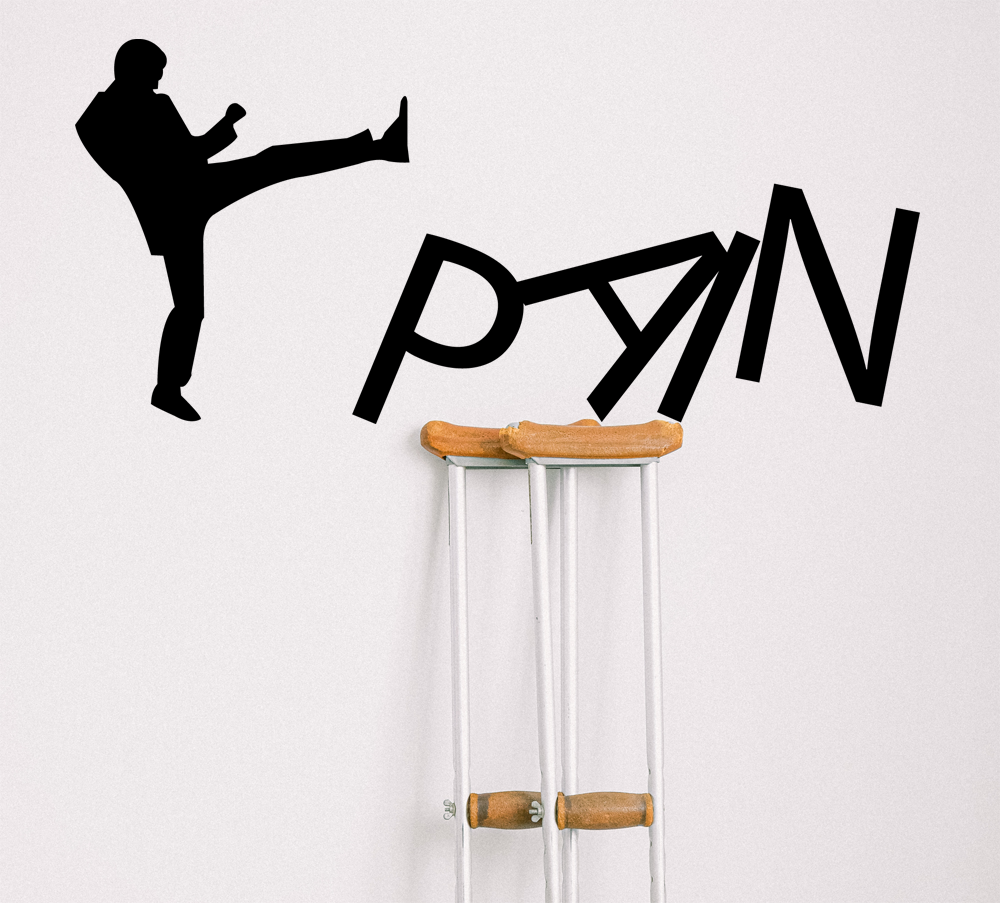
Few Quick Tips on Dealing With Stress in a Hospital
Looking around the ward where I am staying, I see a lot of people stressed, in pain, and or otherwise negative about their state, life, and their future perspectives. Sure, there are many patients with many different problems, but, as much as everything else in life, pain is temporary. Hopefully, they will be given enough correct attention and will be able to go back to their (happy) existence afterwards, looking back at this stay in a hospital as an unexpected, undesired, but surely limited-time ordeal. Of course, there is a chance that the problem will remain or somehow get even worse. Still, physical pain is different from psychological suffering. One does not have to lead to another, meaning that you have physical pain, but it does not have to change who you are as a person.
From my current personal experience, I had this accident, but I was joking and laughing with the nurses, patients, and even doctors during the operation. I was partially awake during my surgery, and they were already trying to keep a cheerful attitude during the operation. Surely, this was a relief for everyone to have some positivity during this already stressful and important period of time, as dealing with negativity just consumes additional psychological resources, which are liberated in a more cheerful and peaceful environment. In other words, positivity recharges people and gives them an extra cup of coffee in terms of energy to become more focused on what they need to do. This personal happy characteristic was later positively remarked by several staff, including the doctors, during my stay. After all, everyone can be negative and we already have too much of it even outside the hospital, so a bit of brightness in a welcome gesture for everyone going through tough times, which in turn, reflects in a faster recovery time and a better hospital treatment.
Of course, positivity should go hand in hand with compassion, as often negative people don’t want to feel like delusional clowns, and don’t want to be the ones who are overly cheerful about everything, unable to relate to the patient’s personal situation and pain. No. You can be positive, compassionate, and cheerful whenever it is called for and to know when to shut up and listen with an open heart if it is called for.
We can even mention the doctors, nurses, and visitors who are present in these places to help patients with the recovery. I’m sure it is tough for everyone to maintain a positive attitude while surrounded with constant negative stimuli of this environment. Still, being there for patients also means to be there for them psychologically. Sure, it can be easier to just close your eyes, distance yourself away from everyone’s hurt, and create a cage around your heart, especially around irrational, emotional, and perhaps even hurtful people that are the general public that ends in these places. However, it’s more mature, helpful, and uplifting to have courage to face negativity with positivity, as, at the end of the day, it is what people need.
When Bad Things Happen to Good People
As a popular expression goes, when bad things happen to good people, good people have something to do with it. As such, in my book Optimal Happiness, I stated that when you are happy, your positivity creates a Law of Attraction effect, where good things are attracted to ones life, while the negative ones are being repelled by it. I used to believe a lot in this law, questioning this whole accident once it happened, with the question “why did this happen to me?” It just didn’t make sense, at least at first. Later, while lying on my hospital bed, I was re-reading the Science of Enlightenment by Shinzen Young and Autobiography of a Yogi by Paramahansa Yogananda, with both stating that bad things can still happen to good people, but the degree of these negative events is reduced dramatically in favor of positive events. In the words of Yogananda, we are simply working some past karma, which can lead to negative events.
Regardless of whether this explanation makes sense to you or not, I still believe that once big negative (and positive) emotional events happen to us in our life, we need to make peace with them, as otherwise they will haunt us for the rest of our lives. By doing this, we liberate ourselves from any and all potential future problems, caused by these peak experiences and we become better human beings overall because of it. As such, by sharing my day-by-day experiences with people who are the closest to me, and writing this article, which I share with the world, I remove all and any hold this accident has over me. Surely, I didn’t have to go through this length to achieve similar results, but since I am a happiness writer, I long ago decided to journal my experiences, so others can see that happiness is possible even in the worst possible moments and be inspired to achieve the similar happiness high in their lives.
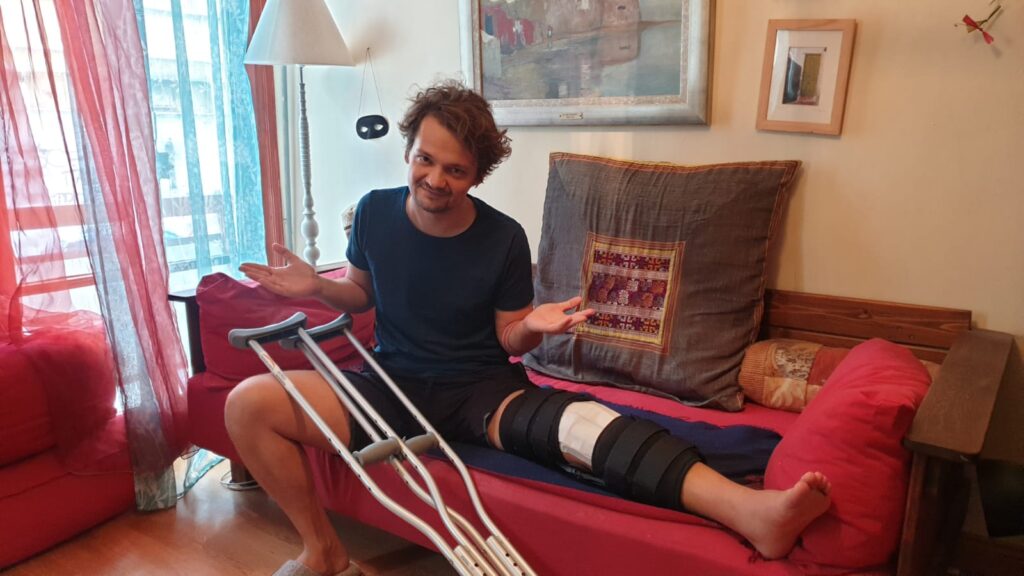
Here We Go Again With the Recovery
It has been almost 3 weeks since the accident. My operation happened about half way, around 10 days after the accident in a completely different hospital than the one that received me, since they were not equipped for the operation. Additionally, 3 weeks after operation I will need to take off the stitches which I am told will leave quite a scar. I can’t put any weight on my leg for 2 month after the operation, since the bone has to grow back together, and after this 2 month mark I will do an X-ray, which will tell the doctor about the next steps. Hopefully, after this period of time, I will be able to start putting weight on the leg and work towards walking without crutches. In the future, there is a high chance of arthritis, unless I will work my muscles, which will help postpone this undesired condition. Overall, I guess only the time will tell how it will go, but so far I am optimistic about the perspective, since all the postoperative tests show good results. Still, this does not mean that I can relax and, in fact, there will be a lot of work needed to be done in the future to stay healthy.
Psychologically speaking, I’m good, not great. The pain reminds itself about its existence, so I regularly have to attend to it, mostly distracting myself in the best possible way, which in a way defines the idealistic views of Optimal Happiness, but at the same time, it does not. It defines Optimal Happiness in the sense that I can’t always be 99%-100% happy, as I wrote it is possible to be in my book, since my well-being was dramatically reduced by the accident. However, at the same time it does not define Optimal Happiness, because I am still as happy as I can be, given the circumstances. Indeed, arguably, I am happier than most people would be in this situation, but I don’t want to tell people to be delusional, as there are some really challenging situations the at people can find themselves to be in, such as people who are forced to live in the middle of a war zone or all these people who ended in the hospital, surely have valid reasons to be there.
Dealing With the Worst-Case Scenario
Often, while teaching happiness, people come to me and say that whatever I am teaching would not apply to them. They are somehow different, their situation is different, or they refer to a hypothetical worst-case scenario that can happen to us. First, whenever I hear these remarks, it makes me think that people are just trying to find excuses for why it will not work for them. These people I always encourage to find reasons why it will work for them rather than why it will not.
Second, just in case people need reassurance that these techniques will work in a worst-case scenario, I believe that breaking my leg for the third time classifies as a “worst-case scenario,” although, as we saw in the case of the hospital, there are people who are suffering way more than I did. As such, I say this with confidence that Optimal Happiness is tested by me and many other people who used its teachings to overcame big and small difficulties in their lives.
Get insurance!
Lastly, you need insurance for happy living. Surely, before my 2 last operations, I had insurance, but I questioned why I was paying for it month after month especially because I was in very good health. However, when push came to shove, literally speaking, I was more than happy not to have paid an extraordinary amount of money out of my pocket. After all, besides excessive debt and bankruptcy, unexpected medical costs are known to be one of the biggest sources for financial unhappiness, destroying lives and families in the process. Therefore, insurance is that necessary happiness cushion we all need to have in our lives, just in case, to be happy.
Have a happy day.

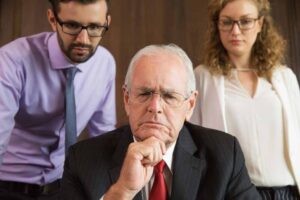

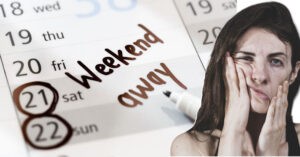
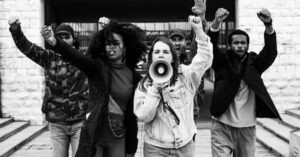


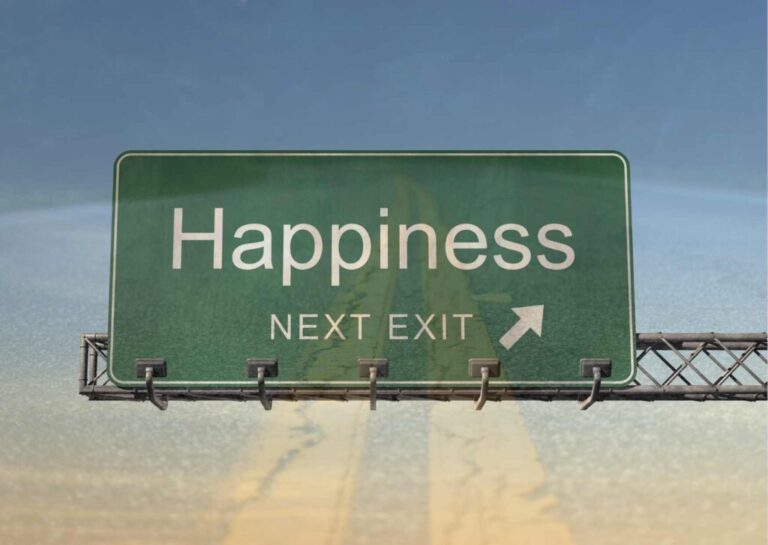



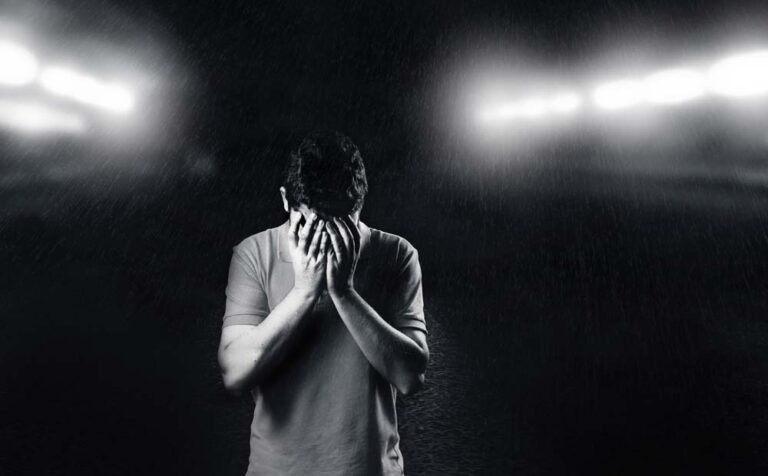


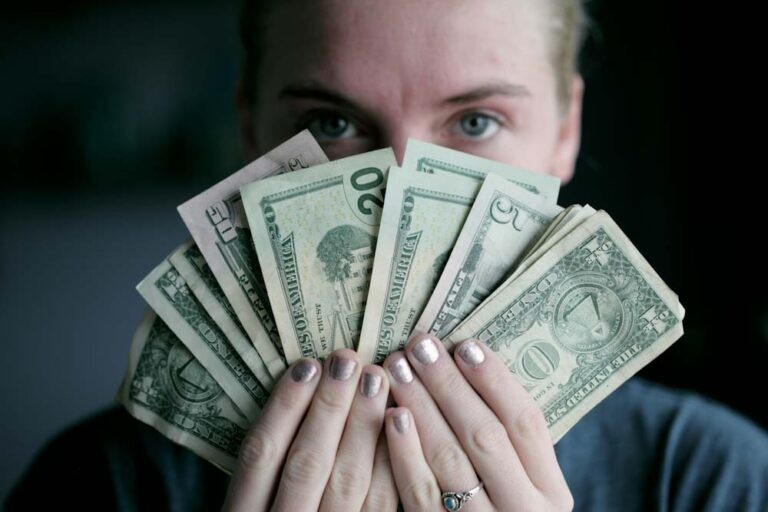

You must log in to post a comment.